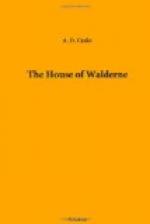Yet more ludicrous was the fate of his brother Richard, King of the Romans, who, while Henry reached the priory wounded, had taken refuge in the windmill, where he was being baited, almost in joke, by the victorious foes, amidst cries of:
“Come out you bad miller!”
“You to turn a wretched mill master!”
“You who defied us all so proudly!”
“You, the ’ever Augustus!”
At length the poor badgered king, seeing that they were preparing to set the mill on fire and smoke him out, surrendered to a follower of the Earl of Gloucester, Sir John Bix, and came out all covered with flour, while men sang:
The King of the Romans gathered a host,
And made him a castle of a mill post.
Meanwhile the camp on the hill, with the banner and the aforesaid litter, had aroused the attention of Prince Edward, just returning from harrying the Londoners.
“Up the hill, my men,” he said. “There is the very devil himself in that litter.”
The camp was stoutly defended, but after a while the defenders were forced to fly by superior force. Then the prince’s men rushed upon the litter, Drogo of Walderne foremost. They thought they had got the great earl.
“Come out, Simon, thou devil, thou worst of traitors,” they cried.
Within were only the four shrinking, timid burgesses, and Drogo and his band dragged them out, shrieking in vain that they were for the king, and cut them to pieces, poor unfortunates. But they did not find Earl Simon, and only slew their own friends; and when the confusion was over they looked down upon the battlefield, where one glance showed them that the main battle was lost, and the barons in possession of the field.
In vain Edward besought his men, now much reduced in numbers, to make another charge. They saw the enemy waiting with levelled lances to receive them, and felt that the position they were asked to assail was impregnable.
Edward was a most affectionate son, and was very anxious to learn the fate of his royal father, so he determined to force his way to the priory at all hazards, and made a circuit of the town so as to reach the sacred pile from the unassailed quarter. Night was now approaching, and the prince’s party had to fight their way at every step with the victorious horsemen of the barons. Edward’s giant strength and long sweeping sword made him a way over heaps of corpses strewn before him, but others were less fortunate.
Hard by the river, on the eastern side of the town, and beneath the high cliffs which rise almost precipitously to the isolated group of downs, there was a terrible charge, a hand-to-hand melee. Drogo of Walderne and Harengod, his sword red with blood, his lance couched, was confronted here by a knight in sable armour, his sole cognisance—the White Cross.
They rode at each other. Drogo’s lance grazed his opponent’s casque: the unknown knight drove his missile through corselet and breast, and Drogo went down crashing from his steed. The combat went sweeping on past them, the desperate foes fighting as they rode. Edward and his horsemen, less and less in number each minute, still riding for the priory, straining every nerve to reach it; the others assailing them at every turn.




